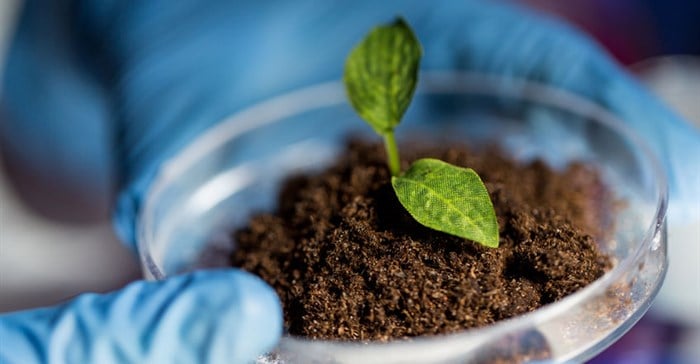
Related

Soil and water: An inseparable partnership in a changing agricultural landscape
Prof Driekie Fourie 4 Dec 2025



Top stories






More news

Marketing & Media
Ads are coming to AI. Does that really have to be such a bad thing?















Frank Winder: Advanced Agri, in conjunction with South African industrial Calcium Carbonate producer iDwala Holdings, is producing a range of high quality and highly reactive granulated calcium based products for the agricultural industry under the brand name EcoCal, including two product ranges:
1. Crop farmers - Calsu, Dolca and Sulca: these products provide for the inclusion of calcium carbonate, magnesium carbonate, and calcium sulphate, which products can be varied in terms of proportion so as to meet a variety of soil and plant requirements.
2. Livestock farmers - GrazeCal: this range includes a buffered and leaching/volatilisation-protected form of coated urea which is ideal for use in preparation of pastures.
The use of calcium in agriculture has been practiced for generations and its importance is well understood and documented. Calcium in the ‘carbonate’ form is notoriously unreactive and moves very poorly in the soil (maybe a centimeter per year). In fact, it can take years for typical calcium carbonate to have an effect in the soil. This is why it is used to mark out sports fields. In reality, this is the first time that it has been possible for farmers to apply calcium in the calcium carbonate form in an effective way in which it is possible to predict when and how it will react in the soil.
Winder: The relationship between Advanced Agri and iDwala has been important for this project because it has brought huge experience in the agricultural business sector together with the strength of an established miner and manufacturer of high-quality calcium carbonate, which has the capacity to predictably produce the amount of raw material to satisfy the market requirements on a long-term basis, which in turn allows for the scale of production needed. It has also allowed for the expertise and experience acquired by Advanced Agri in the area of organic catalysts and their beneficial effects in agriculture.
Winder: There are a plethora of soil treatments on the market for various applications, however, this is the first time that calcium carbonate, magnesium carbonate, and calcium sulphate have been presented (together with an organic acid based binding agent) in such a versatile and effective way. There is no alternative to the application of calcium in agriculture and this is the most cost effective, accurate and predictable way of doing it.
1. Accurate applications of calcium.
2. The products (because of the source of their raw materials) are sufficiently reactive to enable the farmer to know when the product that he has applied will be effective (weeks not years).
3. The products may be applied as part of other operations such as pre-planting fertiliser applications or even planting.
4. Very critically, for the first time calcium carbonate and calcium sulphate products may be placed in the sub-soil, where they can perform the most important function in terms of soil chemistry in the root zone.

Winder: Calcium is critical as a plant nutrient, calcium in the carbonate form is also important to counteract the negative effects of soil acidification which are an effect of the continued application of high volumes of nitrogenous fertiliser required in modern crop production models. This acidification impacts disastrously on soil nutrient availability and results in nutrient deficiencies in the crops being grown which affects yield, quality and probably plant health.
Soil deficiencies in calcium also result in soil structural products, particularly when the balance between calcium and magnesium in the soil is affected and magnesium starts to dominate. This results in poor permeability in the soil which impact on the circulation of water and drainage as well as water holding capacity and the ability for root structures to grow properly (also affecting nutrient and water uptake).
Winder: Certainly soil fertility is becoming more and more important as the pressure is on - firstly to improve the production potential of agricultural land currently being used for production purposes so as to limit yield decline and lift production, and then to ensure that ‘virgin’ soils are not injudiciously damaged by poor agricultural practice.
The reality is that the genetic potential for crops is far higher that the capacity of our soils to produce. The temptation is to chase higher yields by lifting fertiliser application. This has a negative impact on soils and requires remedial action. This can take various forms but, usually, revolves around the balancing of soil chemistry to conform with established norms as well as the lifting of the ‘biologically active’ carbon component of the soil. It is for this reason that we take extensive soil samples for analysis in order to be able to establish how best to address soil imbalances.
Winder: If injudicious agricultural practices are used, yield decline may set in – which is likely to be expensive to avert.
Winder: Products are effective in maintaining soil health or improving soil health as long as they are the correct ones for the job. This will depend on the skills available in assessing the deficiencies and excesses in the soil. These assessments are, of course, in turn, dependent on access to the correct analytical tools – soil analyses, tissue analyses, etc. What is also interesting is the reality that, against commonly held expectation, it is quite possible to improve ‘virgin soil's' quality and potential.
